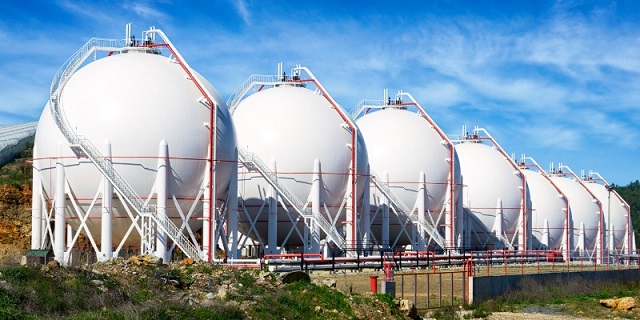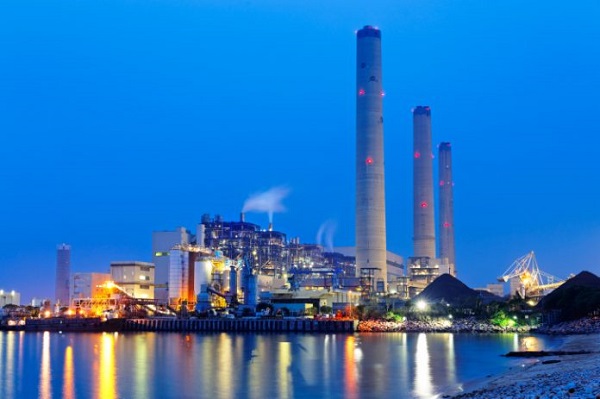Energy
Montreal passes ban on natural gas, oil, and propane in newly constructed buildings

From LifeSiteNews
‘The bylaw on GHG emissions from new buildings represents significant progress in our community’s ecological transition,’ said Montreal Mayor Valérie Plante.
The City of Montreal is set to ban natural gas, oil and propane for heating and cooking in all newly constructed buildings by the tail-end of 2024.
On October 27, Montreal’s executive committee approved a bylaw banning all new buildings constructed with three floors or fewer from having any gas hookups beginning in October 2024 as part of the city’s plan to make its buildings emissions free by the year 2040.
“The bylaw on GHG emissions from new buildings represents significant progress in our community’s ecological transition,” said Montreal Mayor Valérie Plante, according to CBC News.
Under the new bylaw, gas-powered heating systems, hot water systems and items such as stoves, barbecues, pools and spas will be banned from being installed in new buildings. The bylaw takes effect for buildings up to three stories and 600 square meters in area starting October 1, 2024, and for new, larger buildings, starting April 1, 2025.
Buildings which have not been granted a permit by the announced deadline will be required to build under the new regulations.
The ban includes propane, natural gas and heating oil. However, it exempts buildings hooked up to existing urban heating networks as well as industrial buildings.
The bylaw also provides exemptions to outdoor and temporary heaters for construction, generators, commercial use professional stoves, and outdoor barbecues with propane tanks. However, barbecues connected to a propane network or natural gas will be banned.
According to Radio-Canada, those who fail to comply with the bylaw can face fines of up to $4,000 per day for repeat offences.
The bylaw follows recommendations from earlier this year by the city’s water, environment and sustainable development commission. It is also part of Montreal’s 2020-2030 climate plan, which includes a goal of zero-emission buildings by 2040.
The plan is reportedly inspired by Vancouver and New York City, which are set to enforce similar bans on natural resources.
Montreal’s decision comes despite warnings that net-zero goals may be impossible to achieve and could result in compromised infrastructure during Canada’s cold winters.
Earlier this month, Alberta’s electric grid operator condemned the federal government’s net-zero emissions goal by 2035 as “not feasible.”
While Montreal is embracing the energy regulations projected to be detrimental to Canadians, western provinces are increasingly defending the use of natural resources.
Late last month, Smith announced that she is preparing to use her province’s Sovereignty Act to fight the energy regulations proposed by Prime Minister Justin Trudeau’s federal government, which desires to implement policies similar to what Montreal just passed, but on a nationwide scale.
The Trudeau government’s current environmental goals – in lockstep with the United Nations’ “2030 Agenda for Sustainable Development” – include phasing out coal-fired power plants, reducing fertilizer usage, and curbing natural gas use over the coming decades.
The reduction and eventual elimination of the use of so-called “fossil-fuels” and a transition to unreliable “green” energy has also been pushed by the World Economic Forum (WEF) – the globalist group behind the socialist “Great Reset” agenda – an organization which Trudeau and some of his cabinet are involved.
Energy
Federal government continues to reject golden opportunities to export LNG

From the Fraser Institute
By Julio Mejía and Elmira Aliakbari
A recent report released by the National Bank of Canada underscores the potential environmental impact of transitioning from coal to natural gas in countries such as India. According to the report, by 2030 the cumulative effect of this transition would result in up to four times fewer greenhouse gases emissions than what Canada emitted in 2021.
Once again, Canada has missed a crucial opportunity to supply clean and reliable energy to an ally. Polish President Andrzej Duda recently expressed interest in purchasing Canadian liquefied natural gas (LNG) from Canada but the Trudeau government did not offer any concrete commitment in response. We’ve seen this movie before.
During his recent visit to Ottawa, Greek Prime Minister Kyriakos Mitsotakis received the same noncommitment. In January 2023, Japanese Prime Minister Fumio Kishida came to Canada hoping to secure a reliable energy source. In response, Trudeau expressed the importance of Canada as a global energy supplier, only to add the disclaimer that the world is “aggressively” moving towards decarbonization. And in 2022, after Putin’s invasion of Ukraine led Germany to seek ways to reduce its reliance on Russian energy sources, German Chancellor Olaf Scholz asked to buy Canadian LNG but the prime minister gave him the cold shoulder. Apparently, Trudeau found no compelling “business case” to export LNG to Europe’s largest economy.
Of course, Canada’s vast natural resources could make a significant positive impact on global energy security, reliability and emissions reduction by reducing reliance on coal while also creating jobs and economic opportunity here at home. Energy supply shortages have already forced European countries to revert to coal-fired power plants—coal contributes more CO2 emissions per unit of energy than natural gas. In the developing world, India aims to double coal production by 2030 to meet the demands of its burgeoning economy and population. Similarly, China quadrupled the amount of new coal power in 2022 and has six times as many plants under construction as the rest of the world combined.
A recent report released by the National Bank of Canada underscores the potential environmental impact of transitioning from coal to natural gas in countries such as India. According to the report, by 2030 the cumulative effect of this transition would result in up to four times fewer greenhouse gases emissions than what Canada emitted in 2021. To put that in perspective, the impact would be even bigger than completely shutting down the Canadian economy.
Moreover, a recent McKinsey report anticipates an annual increase in global LNG demand of 1.5 per cent to 3 per cent by 2035. And according to the latest report by the International Energy Agency (IEA), limited new LNG production means supply will remain tight. The Biden administration recently halted LNG project approvals, increasing the need for Canada to establish its own infrastructure if we’re to seize the opportunity and become a global LNG supplier.
Unfortunately, Canada currently has no operational LNG export terminals, with the first LNG facility expected to commence exporting by 2025. The Trudeau government has frustrated the development of other LNG terminals, primarily through government regulatory barriers including long approval timelines. The government’s emissions caps on the oil and gas sector and federal Bill C-69 (which added more red tape and complexity to the assessment process for major energy projects) have also created uncertainty and deterred—if not outright prohibited—investment in the sector. Additionally, the British Columbia government’s “CleanBC” plan to reduce greenhouse gas emissions has added more regulation. Not surprisingly, a recent survey revealed that investors identify regulatory uncertainty as a major deterrent to investment in Canada’s oil and gas sector.
With the proper polices in place, Canada could provide an energy alternative to our allies and other coal-consuming countries worldwide. The Trudeau government should acknowledge the environmental benefits of our natural gas resources, reform regulations for energy infrastructure projects so they’re more competitive, and allow our energy industry to be a leading source of clean and reliable energy, for the benefit of Canadians and the environment.
Authors:
Energy
U.S. EPA Unveils Carbon Dioxide Regulations That Could End Coal and Natural Gas Power Generation

From Heartland Daily News
By ![]() Tim Benson
Tim Benson
The U.S. Environmental Protection Agency (EPA) announced new regulations on April 25 that would force coal-fired power plants to reduce or capture 90 percent of their carbon dioxide emissions by 2039, one year earlier than in the rule originally proposed in May 2023.
Other newly announced coal regulations include a final rule “strengthening and updating the Mercury and Air Toxics Standards (MATS) for coal-fired power plants, tightening the emissions standard for toxic metals by 67 percent, finalizing a 70 percent reduction in the emissions standard for mercury from existing lignite-fired sources,” and another rule to “reduce pollutants discharged through wastewater from coal-fired power plants by more than 660 million pounds per year.” The EPA also issued an additional rule to require the safe management of coal ash in locations not previously covered by federal regulations.
“Today, EPA is proud to make good on the Biden-Harris administration’s vision to tackle climate change and to protect all communities from pollution in our air, water, and in our neighborhoods,” said EPA Administrator Michael S. Regan. “By developing these standards in a clear, transparent, inclusive manner, EPA is cutting pollution while ensuring that power companies can make smart investments and continue to deliver reliable electricity for all Americans.”
EPA estimates its new regulations will reduce carbon dioxide emissions by 1.38 billion metric tons by 2047 and create $370 billion in “climate and public health net benefits” over the next twenty years.
Coal in a Regulatory Decline
Partially due to increasingly stringent regulations, electricity generation from coal has fallen from 52 percent of the nation’s total output in the 1990s to just 16.2 percent in 2023. Critics of the new regulations, including Jason Isaac, CEO of the American Energy Institute, argue that EPA’s new rules would make it impossible to open new coal plants and will effectively force those already online to shut down operations.
“These rules are a direct attack on an important and necessary source of American energy—one of our most affordable, reliable resources, and one that is essential here and growing in use around the world,” said Isaac. “The ignorance of this administration is negligent at best, criminal at worst, relegating the least among us to more expensive energy, or even none at all, as millions of Americans are finding out by having their electricity disconnected.
“On one hand they push to electrify everything and then with the other leave us with unreliable electricity,” Isaac said. “The Biden administration is hell bent on destroying coal and reaching new levels of recklessness.”
‘De Facto Ban’ on Coal
The new regulations almost assuredly will face legal challenges from the coal industry and others, says Steve Milloy, founder of JunkScience.com.
“Another unconstitutional EPA rule from the Biden regime that will be DOA at [the Supreme Court] but not until much harm has been caused,” said Milloy. “Congress has not authorized EPA to issue regulations that operate as a de facto ban on coal plants, yet that’s what this regulation amounts to because it mandates emissions control technology (i.e., carbon capture and sequestration) which does not, and will never, exist for coal plants.”
EPA, by contrast, says carbon capture and sequestration (CCS) is the “best system of emission reduction for the longest-running existing coal units” and a “cost-reasonable emission control technology that can be applied directly to power plants and can reduce 90 percent of carbon dioxide emissions from the plants.”
“The requirement for imaginary technology violates Clean Air Act notions of only requiring the best available and adequately tested technology,” Milloy said. “The de facto ban violates the 2022 [Supreme Court] decision in West Virginia v. EPA, which established the major questions doctrine, under which agencies cannot undertake significant new actions, like banning coal plants, without authorization from Congress.”
Natural Gas Targeted, Too
Coal plants were not the only target of new EPA regulations, as natural gas power plants are also now required to eliminate or capture 90 percent of their carbon dioxide emissions by 2032, three years earlier than called for when the draft rule was originally proposed in 2023.
The EPA is acting as if it has absolute power unconstrained by the law and prior court rulings, Darren Bakst, director of the Competitive Enterprise Institute’s Center on Energy & Environment, says in a press release.
“The [EPA] absurdly thinks its authority to regulate means it has the authority to shut down businesses,” said Bakst. “Establishing new regulations for power plants does not mean the agency can effectively force them out of business.
“This is Clean Power Plan Part II, but like with many sequels, it is worse,” Bakst said.
Tim Benson ([email protected]) is a senior policy analyst with Heartland Impact.
For more on the Biden administrations power regulations, click here.
-

 Alberta2 days ago
Alberta2 days agoCanadian Christian chiropractor fights ‘illegal’ $65,000 fine for refusing to wear mask
-

 John Stossel1 day ago
John Stossel1 day agoThe Swamp Survived: Why Trump Failed to “Drain the Swamp”
-

 Media2 days ago
Media2 days agoCBC tries to hide senior executive bonuses
-

 Energy2 days ago
Energy2 days agoU.S. EPA Unveils Carbon Dioxide Regulations That Could End Coal and Natural Gas Power Generation
-

 Education1 day ago
Education1 day agoSchools shouldn’t sacrifice student performance to vague notions of ‘equity’
-

 COVID-191 day ago
COVID-191 day agoCOVID Is Over — But Did We Learn Anything From It?
-

 Automotive1 day ago
Automotive1 day agoNew Analysis Shows Just How Bad Electric Trucks Are For Business
-

 Environment1 day ago
Environment1 day agoScientific Report Pours Cold Water On Major Talking Point Of Climate Activists






